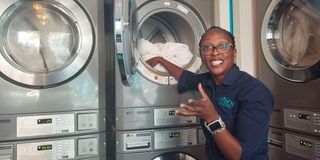Let us wash it for you: The rise and rise of the laundry

Natash Njee at Avana Loundromat. She says they target clients that keep the business going, including barber shops and salons, as well as Airbnbs, which are in constant need of cleaning services for their linen.
As the capital city continues to witness an upsurge of high-rise apartments that deny tenants the benefit of sunlight, many living in Nairobi find it difficult to conveniently engage in household activities such as washing clothes.
And with the situation not getting any better, there could not have been a better time for Natasha Njee and Peter Magelo to start their laundry business, known as Avana.
The idea came about last year during an engagement in a business networking group they are members of, where they heard of a programme by appliances manufacturer, LG, to distribute commercial laundromat machines in the country.
“Magelo, who was relocating to Kenya from America, got interested in the laundromat business because he understood it, having used it,” recalls Njee, Avana’s Managing partner and co-founder.
They did not plunge head-on, they first conducted some research on the laundromat sector in the country, which told them that a gap exists, with many urban dwellers uncomfortable with doing laundry due to lack of time as they juggle between work, traffic and social life.
Njee adds that the research would later lead them to identify how, within Nairobi, many people have opened dhobis within estates while the ‘mama fua’ concept has grown, highlighting a growing need by households to get alternative laundry services.
LG-model laundromat machines
“It’s a service that’s needed. Everyone needs their clothes washed and dried. Many people now live in apartments where there is no space to dry clothes, and when it rains you are in trouble. A lot of people also don’t have time to do laundry,” says, Njee, during the interview, which is taking place at one of Avana’s outlets in Nairobi’s Chaka Place.
In April 2022, following a series of trainings on usage of modern LG-model laundromat machines, they launched the business.

Natash Njee at Avana Loundromat.
Over the past six months, Avana has grown not only in its workforce, but also in terms of number and categories of clients it serves, even as the company positions itself to create a franchise that it believes will revolutionise the laundromat industry in the country.
“The concept of a laundromat was yet to catch up, what we’ve always known is dry cleaning. There was a thinking that people only take posh clothes to laundromats and only if you’ve got money,” Njee comments.
Over the six months, she says the business has had to navigate a strange territory as it attempts to convince a society that still feels uncomfortable allowing someone else handle clothes they consider personal.
Njee also says opening up the business helped them identify other untapped markets such as salons, barber shops and Airbnbs which are always in constant need of cleaning services for their linen, towels and other items to keep running the businesses, and whose needs come on a daily basis.
“We figured that in the laundry business, not everybody has laundry every day. A residential customer would come every two weeks. What you need to sustain your business is then look for the daily turnover of laundry, and so we are targeting salons, gyms and airbnbs since the apartments need their linens and towels done every time a new customer comes,” she says.
This has grown the business to see its turnovers play up to Sh15,000 daily, as it offers clients the washing, drying and folding services.
“We thought it would take a bit of time for the concept to pick up but it just took off.”
The company charges clients Sh120 to launder a kilogram of laundry, with a normal household expected to generate between 7kg and 10kg of laundry in two weeks.
Domestic machines
Njee says features of the laundromat machines that enable them to consume less water and electricity while handling about 10.5kg of laundry any given moment are some of the benefits, since their utility bills have remained low.
“The beauty of these machines is that they are designed like domestic machines as opposed to the legacy commercial machines. They are slim, which means that you are able to use minimal space if you are renting space, minimising rental needs,” she says.
Also, she can be away from the business but still monitor operations, since the machines are connected to the internet.
To successfully run such as business, she advises that location and identifying the client you want to serve is critical, so is using the correct detergents. Some of their main customers are single people living in the environs of Nairobi.
“We want to partner with people who want to come in, operate under Avana and help them find the best location, staffing and set you up with systems that are already working. The idea now is to set up a system and processes that work in a way that investors who don’t want the hustle of setting up from scratch can benefit,” she says.
Entry into this sector has opened doors for this company to distribute LG laundromat machines, since they frequently come across people with interest in the business. And just like any other business, Avana also faces unique challenges.
“Trying to sell the concept that this is for everybody is a bit of a challenge, so has been getting people to trust us, but once they come in, we lock them down with our services and we earn their trust,” concludes Njee.





